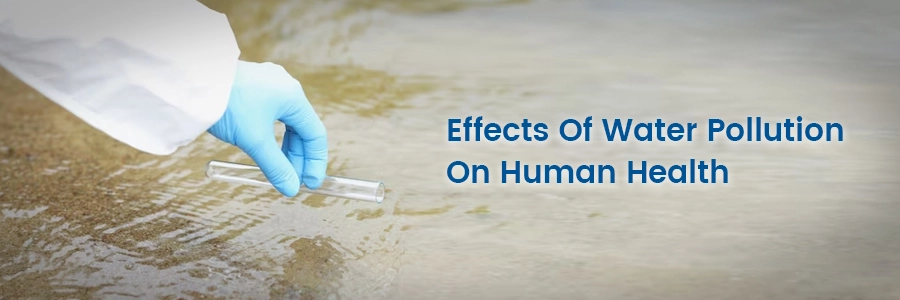Categories
- Cardiology 84
- Dermatology 45
- Endocrinology 33
- ENT 16
- Fertility 190
- Gastroenterology 78
- General-Medicine 81
- Gynecology 80
- Hematology 19
- Infectious-Diseases 33
- Neurology 52
- Oncology 34
- Ophthalmology 23
- Orthopedics 69
- Pediatrics 31
- Procedure 23
- Public-Health 144
- Pulmonology 59
- Radiology 8
- Urology 68
- Wellness 161
- Woman-and-child 77

8 Effects Of Water Pollution On Human Health
Water is one of the essential natural resources on the planet. More than 70% of the Earth's surface is covered in water. Even though there is a significant amount of water, humans can consume only about 0.3% of it.
Various water sources are contaminated by humans resulting in harmful effects of water pollution on human health.
- Contaminated Drinking Water
- Exposure to Toxins
- Skin Irritation
- Respiratory Problems
- Reproductive Problems
- Cardiovascular Problems
- Liver and Kidney Damage
- Cancer
Secure your health with a second opinion. Make informed decisions and book your appointment today!
Get A Second OpinionCauses of Water Pollution
Industrial waste:
Many companies ignore proper waste management practices, resulting in a massive discharge of txins from industrial operations into rivers, oceans, and seas.
Global warming
As the temperature rises, oxygen levels in the water decrease, changing its composition.
Deforestation
The origin of bacteria or other microbes that cause groundwater to become contaminated.
Pesticides
Pesticides sprayed on crops reach water systems through underground channels.
Oil
When transported, gasoline products may leak and end up in the oceans, and the consequences are catastrophic for the water and the biodiversity that lives there.
Effects of water pollution on human health
Contaminated Drinking Water
Consuming contaminated drinking water can lead to various health problems, such as gastrointestinal infections, typhoid fever, cholera, and dysentery.
Exposure to Toxins
Exposure to toxic chemicals, such as lead, mercury, and pesticides, can cause serious health problems, including neurological damage, congenital disabilities, and Cancer .
Skin Irritation
Skin contact with contaminated water can cause irritation,itching,and rashes . In severe cases, it can lead to infections and allergic reactions.
Respiratory Problems
Respiratory conditions like asthma and bronchitis can be triggered by breathing in airborne contaminants from polluted water.
Reproductive Problems
Exposure to toxic substances in water can cause reproductive problems, including infertility, congenital disabilities, and low sperm count.
Cardiovascular Problems
Contaminated water can contain heavy metals that can cause cardiovascular problems , such as heart disease and stroke.
Liver and Kidney Damage
Exposure to contaminated water can cause liver and kidney damage, leading to various health problems.
Cancer
Exposure to certain chemicals and pollutants found in contaminated water has been linked to an increased risk of Cancer, including leukemia and lymphoma.
Ready to take control of your health journey? Book your appointment now and start your path towards wellness today!
Book an AppointmentImpact of Water Pollution
Water pollution significantly affects the environment, human health, and economies.
Environmental Impact
- Ecosystem Damage : Pollutants harm aquatic life, causing biodiversity loss.
- Habitat Destruction : Polluted water destroys essential habitats.
- Algal Blooms : Excess nutrients cause oxygen-depleting blooms, creating dead zones.
Human Health Risks
- Drinking Water Contamination : Leads to diseases like cholera and dysentery.
- Food Safety : Toxins in contaminated water accumulate in crops and livestock.
- Recreational Hazards : Swimming in polluted water can cause infections and illnesses.
Economic Consequences
- Healthcare Costs : Increased expenses for treating pollution-related diseases.
- Fishing Industry Decline : Reduced fish populations impact commercial and recreational fishing.
- Tourism Impact : Polluted water bodies deter tourists, affecting local economies.
Social and Community Impact
- Access to Clean Water : Pollution affects water access, especially in developing countries.
- Livelihoods : Pollution threatens agriculture, fishing, and tourism-based livelihoods.
Solutions and Mitigation
- Waste Management : Proper disposal and treatment reduce pollution.
- Legislation and Enforcement : Strong regulations control pollution sources.
- Public Awareness : Education promotes sustainable practices.
Conclusion:
Water pollution severely impacts human health, causing diseases like cancer, respiratory and cardiovascular issues, and reproductive problems.
It also damages ecosystems, affects economies, and threatens community livelihoods. Addressing water pollution requires proper waste management, strong regulations, and public awareness to ensure a healthier future for all.
Frequently Asked Questions
Water pollution harms human health, ecosystems, and biodiversity, leading to diseases, ecosystem disruption, and loss of aquatic life.
Industrial waste, agricultural runoff, sewage discharge, oil spills, littering, and improper chemical disposal contribute to water pollution.
Contaminated water causes waterborne diseases, skin infections, and respiratory illnesses, posing significant health risks to humans.
Individuals can reduce chemical use, dispose of waste properly, conserve water, and support conservation efforts to prevent water pollution.
Water contamination leads to ecosystem degradation, loss of biodiversity, algal blooms, and groundwater pollution, affecting aquatic life and human health.

Categories
- Cardiology 84
- Dermatology 45
- Endocrinology 33
- ENT 16
- Fertility 190
- Gastroenterology 78
- General-Medicine 81
- General 6
- Gynecology 80
- Hematology 19
- Infectious-Diseases 33
- Neurology 52
- Oncology 34
- Ophthalmology 23
- Orthopedics 69
- Pediatrics 31
- Procedure 23
- Public-Health 144
- Pulmonology 59
- Radiology 8
- Urology 68
- Wellness 161
- Woman-and-child 77